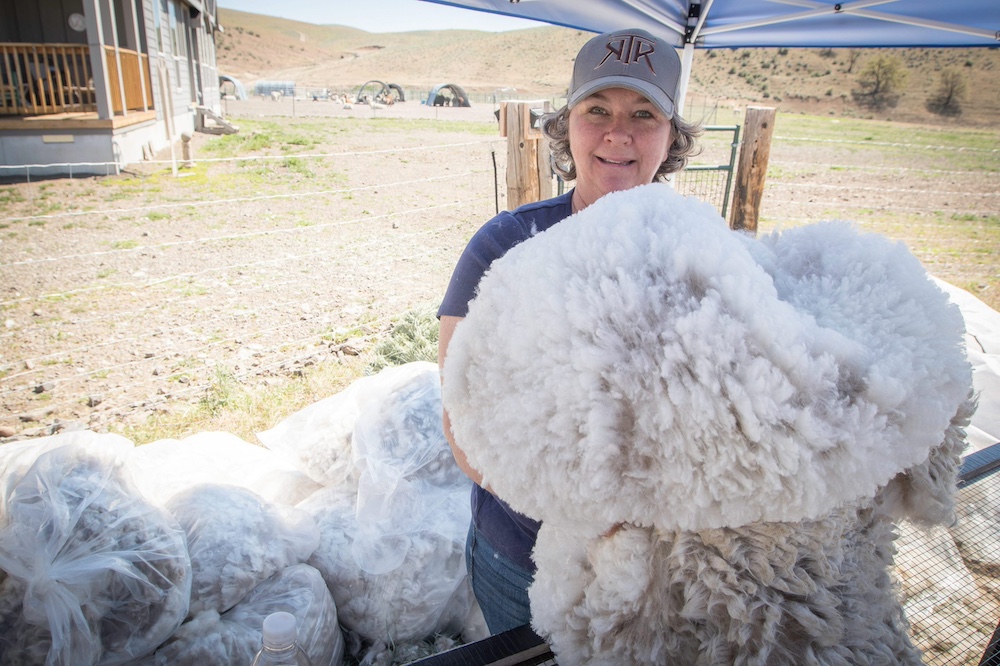
Every Sunday, Botanical Colors sits down for an interview with a luminary in the natural dye and textile world. Grab a cup of tea and settle in to learning about someone you never knew! Catch up on all our Sunday Visits here.
In late 2015, fiber farmer Stacie Chavez along with Lynn Edens purchased Imperial Stock Ranch Fiber. Imperial Yarn, which is a company under the Imperial Stock Ranch Fiber umbrella, is 100% American grown and American made yarn. From that yarn they also make beautiful clothing, home goods, patterns and more.
With around 6,500 acres of land for her animals to graze in Tygh Valley, Oregon, Stacie raises Huacaya Alpacas and Rambouillet Sheep on her ranch as well as purchases fiber from other Climate Beneficial Verified Ranches.
(Reader’s note: Climate Beneficial™ is a verification by Fibershed (501c3 nonprofit), confirming that the fiber is grown on a farm or ranch operating under, and actively implementing, a Carbon Farm Plan.)
Once a year, the soft, white wool is harvested from sheep, and the process of transforming this naturally renewable resource into a wide selection of fibers, fabrics and yarns begins. All the wool is carefully and specially milled without the use of harsh chemicals or extreme temperatures, making every effort to maintain the natural integrity of this comfortable, soft, and pure perfection. With palettes of richly saturated solids and precisely blended heathers, Imperial Yarn offers knitters, weavers, designers and other fiber artists a naturally beautiful array of hues, textures, and weights from which to choose.
We caught up with Stacie to learn more about her take on the future of fiber farming.
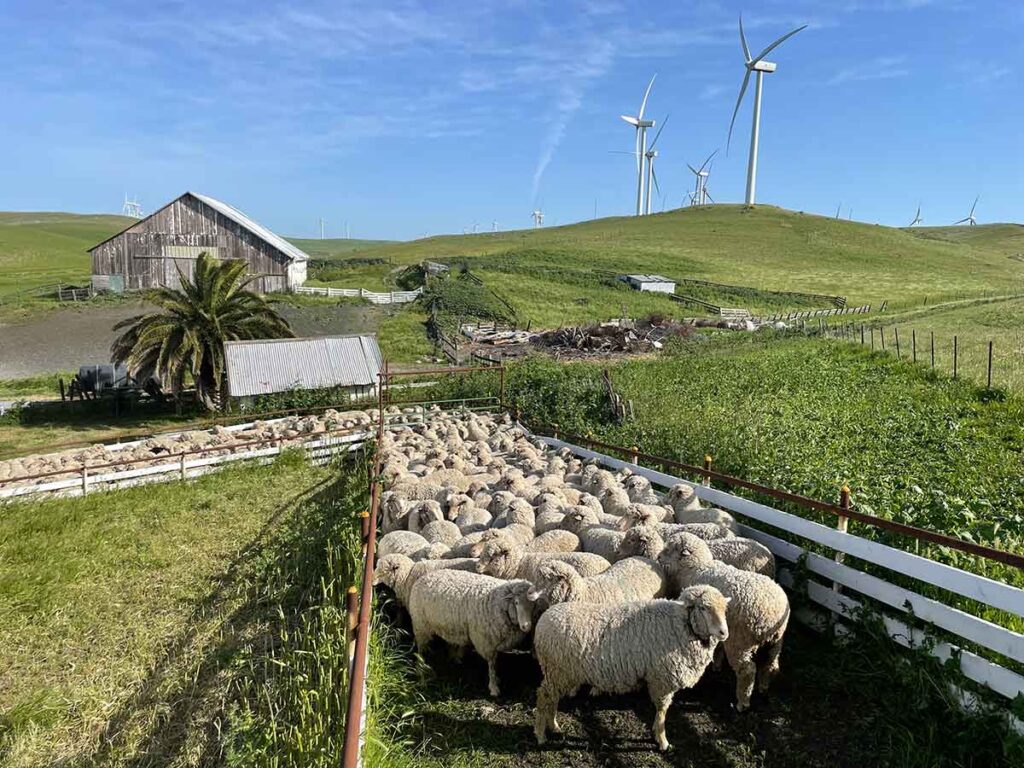
How long have you been in the wool business and what brought you here?
The short answer? I discovered the wonderful world of natural fiber in the fall of 2009, that’s 14 years ago and my life has NEVER been the same. Alpacas, for me, it was love at first sight. Huacaya Alpacas the equivalent of a snuggly teddy bear. I have never had a hobby. Alpacas led me to yarn, yarn led me to dyeing, which led me to exploring other natural fibers. You could say, “Alpacas were a gateway drug for me”! I fell in love with rambouillet sheep, then oh, for the love of colored Merino’s and then angora goats…. and well cotton and hemp. I do not discriminate there is a use for them all. I love to blend and mix them and create beautiful yarns. Oh and how can’t I mention Imperial Yarn, LLC. I love designing and creating with all of our beautiful Climate Beneficial Yarns.
Are you seeing more ranchers and designers working together?
I love bringing ranchers and designers together. When I started working with my very first Climate Beneficial Verified ranch….Emigh Livestock Ranch, in 5 generations they had sold their wool as a commodity and had never held a commercial textile made with their beautiful wool. One of the greatest joys of my life was handing Ryan Mahoney of Emigh Livestock a beautiful throw to give his grandfather. We have now worked with so many brands: OuterKnown, Elizabeth Suzann, Ski Delaine, CO, Mara Hoffman, American Blossoms Cotton, Seek Collective, Vincent James, Wol Hide, NY Textile Lab, Fore Ewe, Sirkl, Barrett Wool, Ritual Dyes, Lana’s Lana, DanaLeeBrown, Modern Daily Knitting, Buffalo Wool Company, Coyuchi, Botanical Colors, and lots more brands on the horizon.
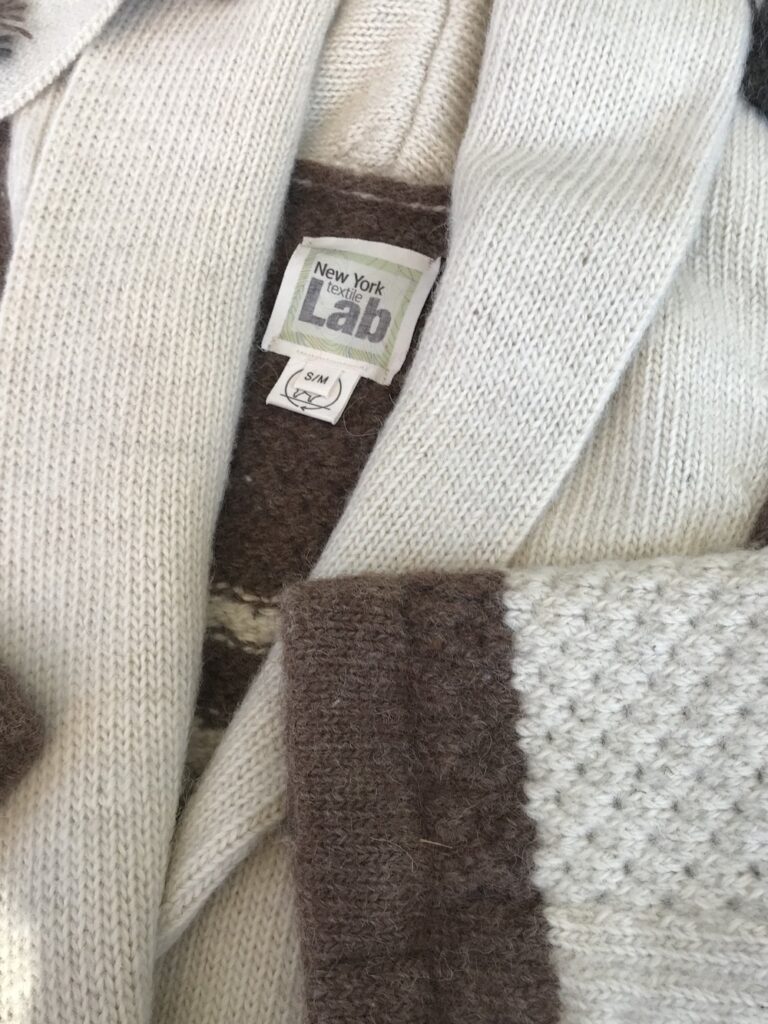
Image: NY Textile Lab
Is there excitement around the Climate Beneficial label you are working on with Fibershed?
Is there excitement? Oh, what Rebecca Burgess of Fibershed has created with Climate Beneficial is AWE inspiring. I am grateful to call Rebecca my friend and I so enjoy working with her and sharing her with the brands we work with together. Brands are excited to be part of the Soil to Soil movement.
Can you talk about the hats we’re selling of yours and the unique blend you have of cotton and wool?
I love creating not only natural fiber goods, but I like creating “blanks” meaning naturally colored wool hats, headbands, scarves, socks, etc. These pieces allow brands like Botanical Colors, to put their personal touch on them. We have worked together on socks for Imperial Yarn and this is our second year of working on hats. This year I was so excited when you added not only our wool, but also our new C4 Cotton, Climate Beneficial Wool and Climate Beneficial Alpaca hats to your offerings.. I have wanted to create a short staple blend of cotton/wool and alpaca for years and in 2023, that dream became a reality. I know people say, why? Well I love the way the wool and alpaca helps give the cotton insulation and it brings a little luster to the yarn. Just by adding 10% Wool and 10% Alpaca to cotton, it gives the cotton added warmth. My dream is to one day make denim that incorporates the three fibers, that way I won’t have to wear leggings under my jeans in the winter when I am doing chores.
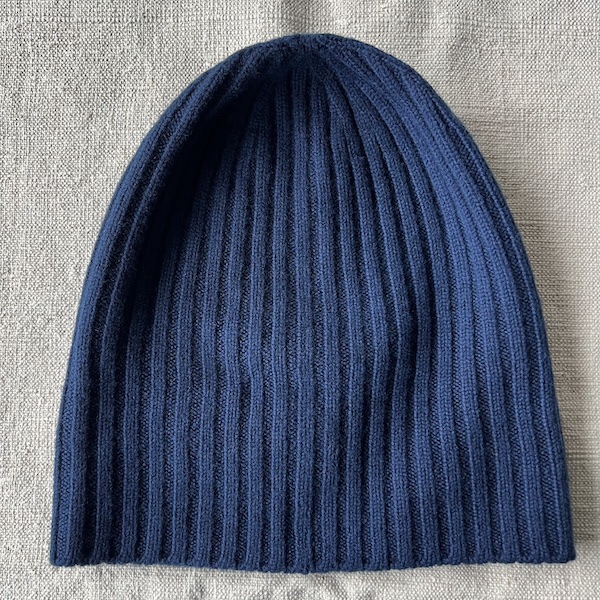
Botanical Colors x Imperial Yarn Climate Beneficial Indigo Dyed Beanies
Are you seeing more people supporting wool farming? People are so excited to be part of the natural fiber movement. Brands love digging in and getting their hands dirty at “on the farm events”. Whether it’s attending a Carbon Farm Tour or helping to plant a windbreak. Brands are eager and ready to be a part of implementing one or some of the 35 Carbon Farm practices.
Is there excitement around the Climate Beneficial label?
There is a lot of excitement when it comes to the Climate Beneficial Label. Brands are so excited to welcome the branding onto their website or hang tags. I love seeing how the same brands come back year after year. When they welcome Climate Beneficial into their brand they become part of our ranching family.
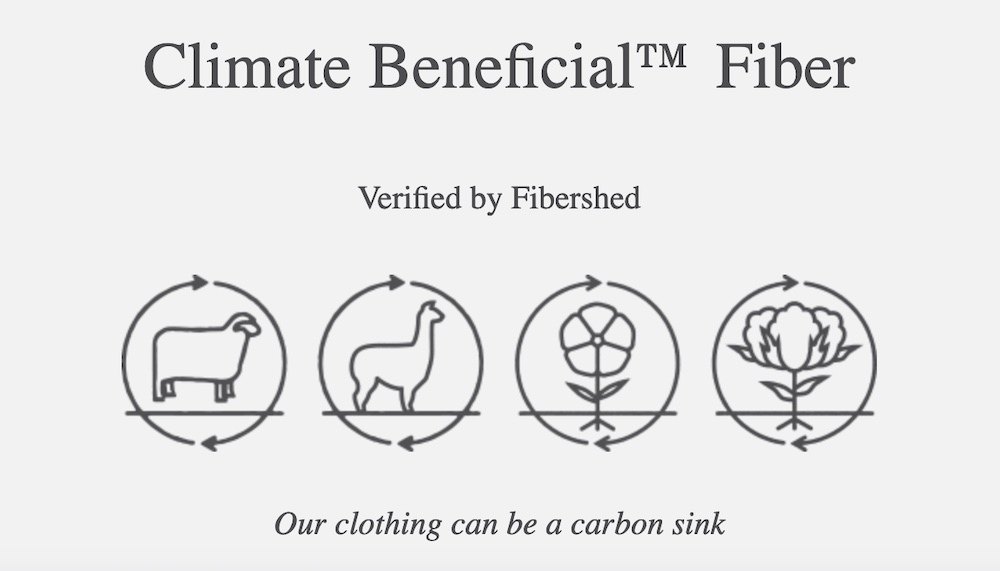
What do you see as the future of wool?
Well I see the Climate Beneficial “movement” growing larger and larger. In September 2022 it was announced that NCAT and its five Climate Beneficial™ Fiber project partners; Carbon Cycle Institute, Colorado State University Department of Soil and Crop Sciences, Fibershed, Seed2Shirt, and New York Textile Lab, will receive up to $30 million to support the expansion of climate-smart wool and cotton production on 135 farms and ranches spread across 2.1 million acres. The project builds on the existing Climate Beneficial fiber program, which has a track record of growing America’s ability to produce climate-smart fiber, regenerate our soils, and expand economic opportunities for wool and cotton growers. This will bring more growers into the Climate Beneficial movement and help to create more and more Climate Beneficial Natural Fibers.
Do you have a favorite color right now and what is it?
I am a lover of pinks and blues. Don’t make me choose one. Right now, madder root extract is one of my favorites. There are so many shades of pinks. Blues, well where would be if there wasn’t indigo? So many gorgeous shades of blue. Deep midnight to soft pastel blue. I am loving my deep appreciation for all of the natural dye materials. Check back regularly, I could add something else to my list of favorites.
You might also like to read:
Sunday Visit: Evolving Fibershed With Rebecca Burgess
Video From FEEDBACK FRIDAY: Fibershed Ireland Takes on Linen + Woad
Video From LIVE FEEDBACK FRIDAY: Lani Estill
Shop:
Botanical Colors x Imperial Yarn Climate Beneficial Indigo Dyed Beanies
